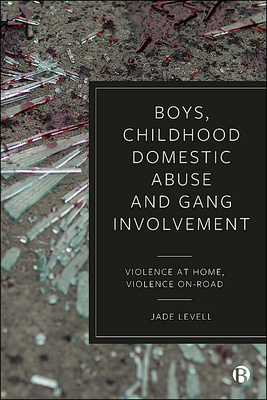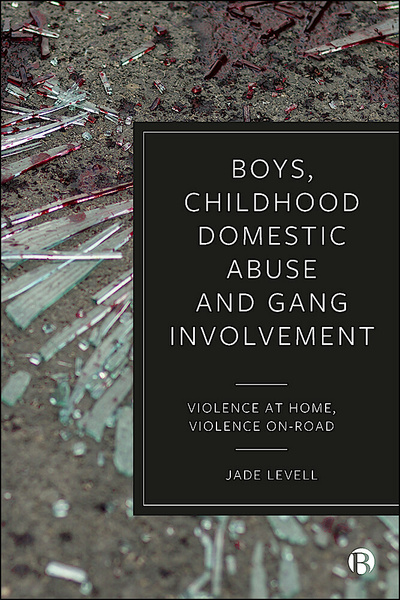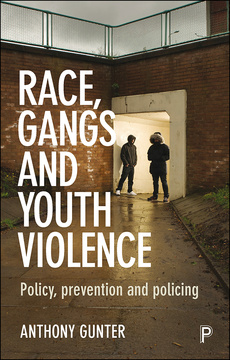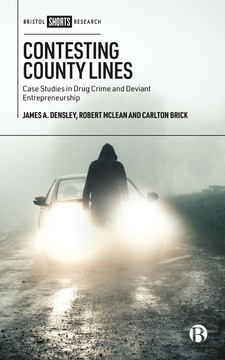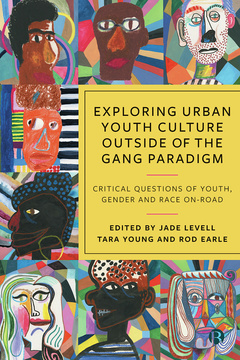Boys, Childhood Domestic Abuse and Gang Involvement
Violence at Home, Violence On-Road
By Jade Levell
Published
Jun 13, 2022Page count
216 pagesISBN
978-1529219807Dimensions
234 x 156 mmImprint
Bristol University PressPublished
Jun 13, 2022Page count
216 pagesISBN
978-1529219814Dimensions
234 x 156 mmImprint
Bristol University PressPublished
Jun 13, 2022Page count
216 pagesISBN
978-1529219814Dimensions
234 x 156 mmImprint
Bristol University PressOn our blog: Invisible child victims of DVA become hyper-visible in gangs: Jade Levell
Podcast on Now and Men: 'Boys, Domestic Abuse and Gang Involvement - Eliciting Men’s Stories Through Music'
In the media:
Book highlighted in the Domestic Abuse Commissioner’s consultation on the Criminal Injuries Compensation Scheme Review
"Society has failed to support very vulnerable children" for Dagens Nyheter.
Boys and young men have been previously overlooked in domestic violence and abuse policy and practice, particularly in the case of boys who are criminalized and labelled as gang-involved by the time they reach their teens.
Jade Levell offers radical and important insights into how boys in this context navigate their journey to manhood with the constant presence of violence in their lives, in addition to poverty and racial marginalization. Of equal interest to academics and front-line practitioners, the book highlights the narratives of these young men and makes practice recommendations for supporting these ‘hidden victims’.
“For anyone working with young people involved with violence and drug gangs, this is an important book which gives another perspective to understanding those who have been drawn in to such a world.” Seen and Heard
"Jade Levell emphasises that the vast majority of children who grow up with domestic violence do not end up in criminal gangs. This is because domestic violence is so common. And she also emphasises that not all boys who are exposed to domestic violence become criminals and violent themselves." Dagens Hyheter
“Sometimes a book comes along that …merits attention from practitioners, because it helps them understand the dynamics of the issues they engage with – this is such a book. These accounts do not make for easy reading and I was brought to tears more than once.” Restorative Justice Council, Resolution magazine
“This book offers crucial recommendations for practice and policy. It will be of interest to researchers, practitioners, policymakers and those who are keen to get beyond simplistic and deterministic perspectives on childhood DVA and engage with the politics of gender, race and class.” Children & Society
“Using music elicitation interviews, Levell offers a unique insight into the impact early childhood trauma, via hidden experiences of domestic violence, has on the life trajectories of gang-involved young men.” Robert McLean, University of the West of Scotland
“Jade Levell has produced a study which is methodological, creative and original. The book offers important insights into the relationship between childhood traumas and young people’s involvement with gangs. It should be essential reading for anyone seeking to understand how to help young men navigate trajectories into adulthood.” James Windle, University College Cork
"Combining methodological innovation and compelling analysis, this ground-breaking book by Jade Levell is indispensable to anyone seeking to make sense of violence in the lives of boys and young men." Keir Irwin-Rogers, The Open University
“A timely and thought-provoking book that shines a spotlight on the intersection of masculinities and social inequalities for boys from marginalized backgrounds living in contexts of violence.” Claudia Bernard, Goldsmiths, University of London
“This brutally honest book explores the ways in which domestic violence, trauma, and fear interact to create 'on road' identities. Academics, students, and practitioners interested in this subject should read this book.” Tara Young, University of Kent
Jade Levell is Lecturer in Criminology and Gender Violence at the University of Bristol.
Part 1: Foundations
1. Masculinity, Marginalization, and Patriarchal Violence
2. Invisible Victims of Domestic Abuse, Hypervisible in Gangs
3. Music as Method
Part 2: Life-History Research
4. Childhood Domestic Violence and Abuse
5. Learning How to Be a Man On-Road
6. ‘a man’/‘The Man’
7. Love and Fear
8. The Road Ahead
Part 3: Joining the Dots
9. Policy Links: Why is ‘Domestic Abuse’ Not ‘Serious Violence’? A False Dichotomy
10. Understanding the Pathways from Domestic Abuse to Gang Involvement
11. Masculinity, Vulnerability, and Violence







